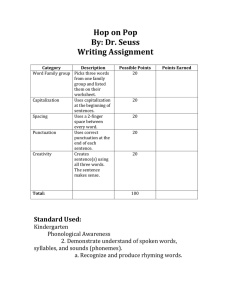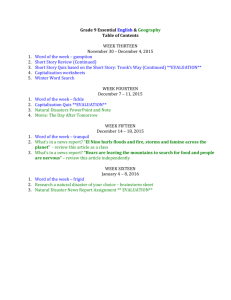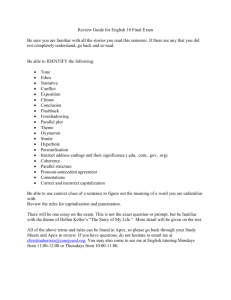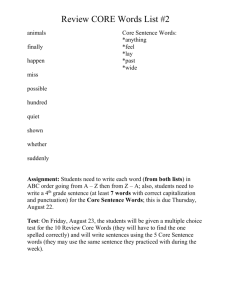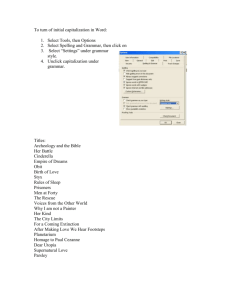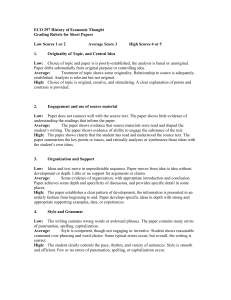p Chapter 20 Land—Control and Use
advertisement
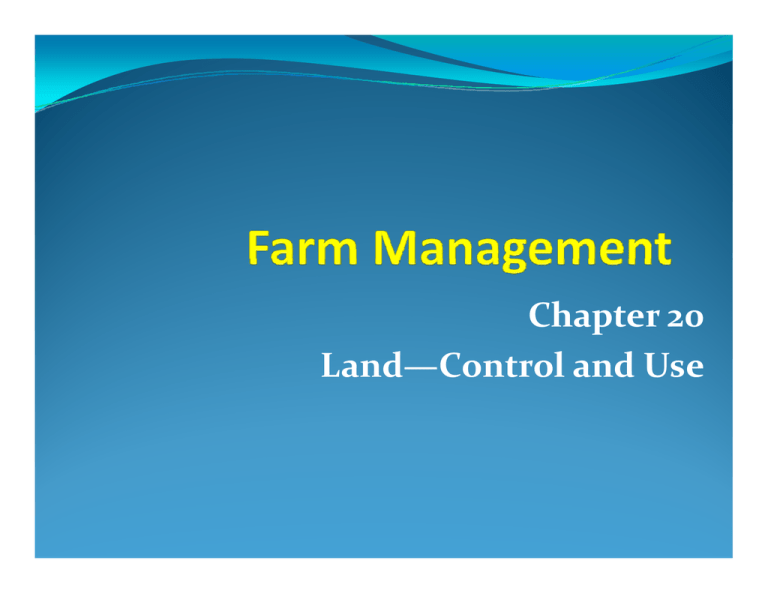
p Chapter 20 Land—Control and Use The Economics of Land Use and The Economics of Land Use and Management Land is a permanent resource that doesn’t depreciate p or wear out. Land is immobile and cannot be moved. Because the supply of land is essentially fixed,, land prices p are very y sensitive to changes in demand for its products. The Economics of Land Use and The Economics of Land Use and Management, said differently. Land is a permanent resource that doesn’t depreciate or wear out. out cannot be depreciated for tax purposes but that can be mismanaged or degraded. Land is immobile and cannot be moved. Because the supply of land is essentially fixed, Agricultural land prices values are sensitive to changes in demand for its products, non-ag market forces and often reflect additional rent capitalization p created byy government g programs. Controlling Land Own or Lease? Controlling Land—Own or Lease? q How much land to control and how to acquire it are two of the most important decisions to be made by any farmer or rancher. Land acquisition should be thought of in terms of control, t l which hi h is i achieved hi d by b ownership hi or by b lleasing. i * You need to adjust j your y thinkingg to one that utilizes opportunity costs, incentives and long-term planning if you are to make informed and intelligent land control decisions. Thi does This d nott imply i l that th t you ought ht only l make k long-term l t land l d control arrangements. O hi Ownership Advantages 1. Security and independence 2. Loan Collateral – accumulation of equity 3. Hedge Inflation / Investment 4. Emotional Disadvantages 1. Cash flow 2. Lower return to land than other uses of assets (?) 3. Less working capital 4 4. Size limits Leasing d a tages Advantages 1. More working capital 2. Additional management g 3. Allows flexibility in operation size 4. More flexible financial obligations 4 g Disadvantages 1. Uncertainty of future control 2. Slower equity accumulation 3. Improvements to land come slower, generally Lease Type Advantages Disadvantages Crop Share* Simple and commonly used. Changes in technology may require terms to be renegotiated. Risk is equally shared. shared Cash Rent Very simple. Owner has no A fair cash rent is difficult to risk. i k O Operator t can make k own negotiate. ti t Operator O t bears b decisions. all the risk. Owner gives up control over the farm. Custom Operator has no risk. Diversifies the operator’s income sources. Owner has a higher income potential. Owner retains control. Owner retains all risk. Operator has limited income potential. *Income and/or expenses may be split in differing proportions. Economic Feasibility of Owning Economic Feasibility of Owning Land We’re asking the question, is owning land profitable? W ’ ki h i i i l d fi bl (We’re not yet ready to address whether or not it is financially feasible ) financially feasible…) 3 What do you need to know? y Purchase price / value y Net income YOU expected based on the intended use p 3 Where can you find the information? y Land Appraisal (determining value) Market data 1. http://www.landwatch.com/Iowa_land_for_sale/Story_County y y y y y y y y Soil, topography, and climate Buildings and improvements g p Size Markets C Community i Location Competing uses Agricultural program characteristics Land Appraisal (determining value) 2. 2 Income capitalization Avg Annual Net Return Value = Discount Rate Income capitalization ≠ Market data 3 Does the income capitalization method produce the same value of land as market data suggests? 3 We did an in‐class example of how to calculate the value of agricultural land based on the typical corn or beans production operation in Iowa using the income capitalization approach. What happens if the income capitalization approach does not predict (not even close, in many cases) the market value that you observe? Important Concepts / Topics from Lecture April 9 and Tim Fevold’s Presentation on April 7 − Know the advantages and disadvantages of the two ways to control land - owning and leasing – for both the operator and the landowner. − Be able to identify how market price changes, interest rate fluctuations, uncertainty over yields, and other forms of uncertainty affect the land owner and land operator in both land-purchase and lease situations. − Be able to differentiate between the different lease types - cash, crop-share, other – and know the basic characteristics of each. − Know the factors that affect the market value of agricultural land and be able to describe each briefly. − Be able to describe the Income Capitalization approach to determining the value of land. − Calculate the Income Capitalization value of land if given a discount rate, expected revenue / income from the land, and variable and fixed production costs − Know how changes to the above items (price, yields, fixed and variable costs, discount rates, etc) affect the value of land if using the Income Capitalization method.
